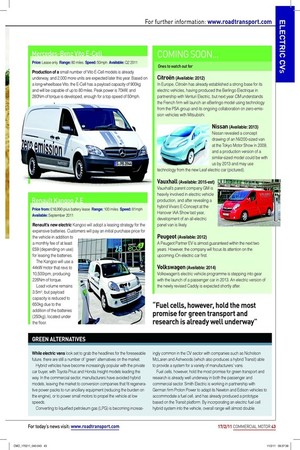GREEN ALTERNATIVES
Page 36

If you've noticed an error in this article please click here to report it so we can fix it.
While electric vans look set to grab the headlines for the foreseeable future, there are still a number of ‘green’ alternatives on the market.
Hybrid vehicles have become increasingly popular with the private car buyer, with Toyota Prius and Honda Insight models leading the way. In the commercial sector, manufacturers have avoided hybrid models, leaving the market to conversion companies that fit regenerative power packs to run ancillary equipment (reducing the burden on the engine), or to power small motors to propel the vehicle at low speeds.
Converting to liquefied petroleum gas (LPG) is becoming increas ingly common in the CV sector with companies such as Nicholson McLaren and Ashwoods (which also produces a hybrid Transit) able to provide a system for a variety of manufacturers’ vans.
Fuel cells, however, hold the most promise for green transport and research is already well underway in both the passenger and commercial sector. Smith Electric is working in partnership with German firm Proton Power to adapt its Newton and Edison vehicles to accommodate a fuel cell, and has already produced a prototype based on the Transit platform. By incorporating an electric fuel cell hybrid system into the vehicle, overall range will almost double.












































